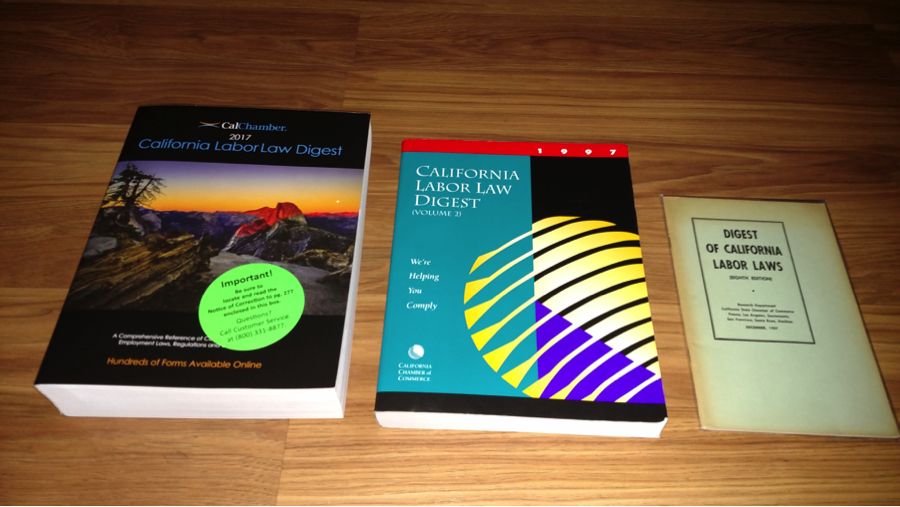The annual Small Business Day event hits Sacramento today with elected officials recognizing small businesses from their districts. All small business people are not alike in attitude and reaction to government requirements but you can take the temperature of small business attitudes when owners of small businesses gather together. So it was when I dropped in on a group of small business owners and executives in Los Angeles County last week. From this group the word expressing their experiences running a small business in California is: Disgruntled.
 The group of about 20 was made up mostly of small manufacturers and service providers. The issue that continued coming up dealt with the multitude of suffocating labor laws. No wonder. Take a look at the picture of books each containing the state’s labor laws from a different year. The thin volume on the right is from 1957. Next is the 1997 edition. Finally, the thick volume is from 2017. How do small businesses expect to cope with so many rules to follow?
The group of about 20 was made up mostly of small manufacturers and service providers. The issue that continued coming up dealt with the multitude of suffocating labor laws. No wonder. Take a look at the picture of books each containing the state’s labor laws from a different year. The thin volume on the right is from 1957. Next is the 1997 edition. Finally, the thick volume is from 2017. How do small businesses expect to cope with so many rules to follow?
Specifically, the small business people spoke out against Private Attorney General Act (PAGA) lawsuits, workers compensation rulings and minimum wage effects on their businesses.
While they spoke of taking care of their workers and having three and four generations of workers sticking with their firms, a few unhappy workers can upset a business my teaming with attorneys to find minor infractions in the labor code. Threatened lawsuits and/or settlements often amount to hundreds of thousands of dollars to millions of dollars in payouts because of the penalty/fine structure in the law.
The PAGA lawsuits were of particular concern. A couple of businesses represented around the table paid out hundred-of-thousands to million dollar payouts. An example: checks that did not show the inclusive date of the pay period but only the end date. A violation according to the law. Workers were not hurt by this small infraction but because it occurred many times on numerous checks, each with a fine attached, the employer paid up—and the lawyers took most of the rewards by forcing a settlement and turning little over to the state. By fashioning a settlement—which most businesses do to avoid lengthy and expensive trials and ultimate catastrophic penalties—lawyers are able to manipulate the law and avoid turning over three-quarters of the penalty to the state.
Workers comp payouts were also an issue with California payments the highest in the nation. Minimum wage increases will cost larger businesses seven figure increases on their books, which some complained they could not handle.
Frustration at the event was evident. Some ideas expressed:
With government’s negative approach to business: When did it become a nasty or dirty thing to be an entrepreneur?
How to lessen road congestion? Instead of building roads we’ll be chasing the poor and middle class out of the state with business regulation destroying jobs.
Efforts to steal away businesses from the Golden State was a recurring theme: In one instance, a state offered a company an incentive based on the number of employees–anywhere from $20-35,000 per employee–to move. It was pointed out that a business with 700 employees can use that money to build a new factory. One owner has already made a trip to Las Vegas to check possible moving sites and conditions in Nevada.
Sure this meeting was only a small sample of the business community. But these owners and executives were restless and public officials would be smart to focus on the concerns expressed at the meeting before a small business exit damages the California economy.

